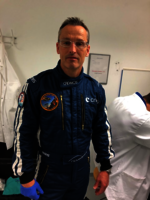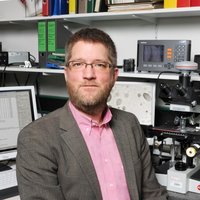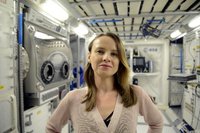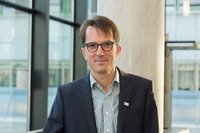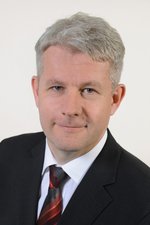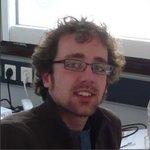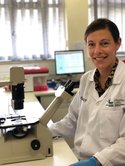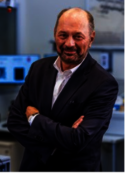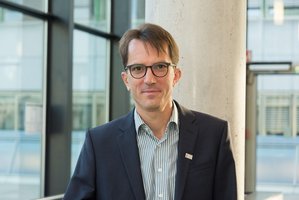Dr. Damian Miles Bailey
Trainer’s name: Damian Miles Bailey
Trainer’s position: Royal Society Wolfson Research Professor of Physiology
Trainer’s email and phone number: damian.bailey@southwales.ac.uk
Damian M. Bailey embarked on a PhD in human physiology while working as a clinical physiologist at the British Olympic Medical Centre in conjunction with Oxford University. Following postdoctoral training at the Universities of California San Diego, Colorado Health Sciences Center (USA) and Heidelberg (Germany), he returned to the University of South Wales where he is currently the Royal Society Wolfson Professor of Physiology and Director of the Neurovascular Research Laboratory. His clinical research programme takes an integrated translational approach to investigate how free radicals and associated reactive oxygen/nitrogen species regulate oxygen delivery to the brain across the spectrum of human health and disease. He has published over 350 manuscripts and his research has attracted widespread media interest, international awards and fellowships from the Royal Society, Royal Society of Chemistry, American College of Sports Medicine and The Physiological Society for contributions to clinical neuroscience. He is Chair of the Life Sciences Working Group (European Space Agency) and member of the Senior Advisory Exploration Committee (UK Space Agency) and is currently funded to examine how the human brain responds to the challenges posed by deep spaceflight. Professor Bailey has represented his country both as a footballer and athlete and remains a keen mountaineer having led numerous medical research expeditions to the Himalayas, Russia and South America.
Dr. Thomas Berger
Trainer’s name: Dr. Thomas Berger
Trainer’s position: Head Biophysics Group, Radiation Biology Department, DLR
Trainer’s email and phone number: thomas.berger@dlr.de; +49 2203 60131 35
Thomas Berger studied physics at the Technical University of Vienna (TUW), Austria and graduated with a PhD in radiation physics in 2003. In 2003 he joined the German Aerospace Center (DLR), Institute of Aerospace Medicine where he became leader of the Biophysics Research Group in 2009. At DLR his main research topic is radiation protection including the development of radiation detectors as well as investigations for the radiation load received by humans for missions beyond Low Earth Orbit (LEO). He is currently the Principal Investigator (PI) for the DOSIS 3D experiment aboard the International Space Station (ISS) and the Matroshka AstroRad Radiation Experiment (MARE) project which flew to the Moon (and back) with the NASA Artemis I mission at the end of 2022.
Dr. Marco Durante
Trainer's name: Prof. Dr. Marco Durante
Tainer's position: Director, Biophysics Department, GSI Helmholtzzentrum für Schwerionenforschung
Professor of Physics, Technische Universität Darmstadt, Germany
Trainer's position Email and phone number: m.durante(at)gsi.de, +49 (0)6159 71 2009
Prof. Dr. Marco Durante has dedicated his research efforts to the biophysics of high-energy charged particles, with applications in cancer therapy and space radiation protection. He is generally recognized as world leader in the field of particle radiobiology and medical physics and is co-author of over 450 papers in peer-reviewed scientific journals (h-index=57) and one patent on proton therapy. He is currently chair of the ESA Topical Team on Space Radiation and of the Particle Therapy Co-Operative Group (PTCOG). Prof. Durante has been awarded several prizes for his contributions to charged particle biophysics, including the 2013 IBA-Europhysics Award for Applied Nuclear Science and Nuclear Methods in Medicine (European Physics Society), the 2013 Bacq & Alexander award of the European Radiation Research Society (ERRS), and the 2020 Failla award of the Radiation Research Society (RRS). He is recipient of an ERC Advanced Grant in 2020 on particle.
Dr. Paolo Ferri
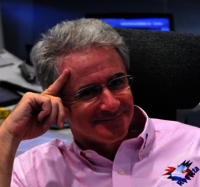
Trainer’s name: Paolo Ferri
Trainer’s position: Former Head, ESA Mission Operations (retired)
Trainer’s email and phone number: paonihon@yahoo.de / +49 170 2283200
Paolo Ferri studied theoretical physics at the University of Pavia (Italy). He joined ESA in 1984 at the European Space Operations Centre as visiting scientist, then soon moving to the field of mission operations, working on several scientific missions. In 2006 he became Head of the Solar and Planetary Missions division, and from 2013 to 2020 Head of ESA’s Mission Operations Department. From 1996 to 2016 he built and led the team in charge of the Rosetta mission operations. He is member of the International Academy of Astronautics, Fellow of the Royal Aeronautical Society, and currently active in training, education and outreach activities. He has published several technical and scientific papers, and written three books for the general public, including one on the Rosetta mission: “Il cacciatore di comete” (Laterza, Italy, 2020).
Dr. Anna Fogtman
Trainer’s name: Anna Fogtman
Trainer’s position: Crew Exploration Scientist
Trainer’s email and phone number: anna.fogtman@esa.int , +49 2203 60 01455
Crew Exploration Scientist at the European Astronaut Centre (EAC) in Cologne, Germany. Her work includes health risk assessment of astronauts during exploration-class missions beyond Low Earth Orbit and coordination of ESA funded science experiments with the focus on radiation research and radiation protection. She studies biological effects of space radiation environment on the human body, especially in the context of individual susceptibility. She obtained PhD in Systems Biology at the Polish Academy of Sciences in Warsaw, Poland. Earlier she was a researcher at the University of Warsaw and Polish Academy of Sciences focused on large-scale OMICS analyses for medicine and life sciences.
Dr. Christian Graeff
Trainer’s name: Christian Graeff
Trainer’s position: Group leader Medical Physics
Trainer’s email and phone number: c.graeff@gsi.de, +496159711848
Prof Dr. Christian Graeff received his PhD in Biomedical Engineering at the Hamburg University of Technology in 2010. Since 2012, he is group leader of Medical Physics in the Biophysics department of GSI, Darmstadt, Germany, since 2018, he is the deputy scientific director of this department and since 2021 Professor for Technology of Radiotherapy at TU Darmstadt, Germany.
His main research interest are advanced treatment planning and delivery strategies for particle therapy, in particular for moving targets. Dr Graeff devised 4D-optimization strategies for conformal motion mitigation, which his group implemented in treatment planning and dose delivery systems.
Dr. Radek Pleskac
Trainer’s name: Dr. Radek Pleskac
Trainer’s position: FAIR/APPA coordinator for BIOMAT project
Trainer’s email and phone number: R.Pleskac(at)gsi.de, +49-6159-71 2432
Radek Pleskac obtained his PhD in nuclear physics at the Charles University in Prague, the Czech Republic in 2003. His work was devoted to experimental study of properties of hot and dense nuclear matter created during relativistic heavy-ion collisions within the TAPS and HADES scientific program.
In 2004 he was awarded with a EURATOM fellowship for 2-years stay at GSI Darmstadt to measure selected spallation cross-sections at FRS (Fragment Separator) relevant for future accelerator driven systems.
In 2007 he moved to the biophysics department at GSI Darmstadt and his fields of interest was experimental study of nuclear fragmentation processes relevant for space research and tumour therapy. He was a person of charge for the FIRST (Fragmentation of Ions Relevant for Space and Therapy) experiment performed in 2011 and also for the irradiation facility in cave A.
Since 2013 he is the resource and technical coordinator for the BIOMAT project within the APPA pillar. He coordinates planning and realization of the BIOMAT experimental facility at future FAIR.
Dr. Thomas Reiter
Andreas Rudolph
Dr. Christoph Schuy
Trainer’s name: Dr. Christoph Schuy
Trainer’s position: Scientist GSI, Biophysics department, Dramstadt, Germany
Trainer’s email and phone number:c.schuy(at)gsi.de; Tel.: 06159-71-1558
Dr. Christoph Schuy graduated with a PhD (Dr. rer. nat) in physics from the Technical University of Darmstadt hosted by GSIs biophysics department in 2014. His main research focus as a PostDoc researcher in the Space Radiation Physics group of GSIs biophysics department is nuclear fragmentation experiments for particle therapy and space radiation protection. He has specialized mainly in cross section measurements and the development and verification of passive beam modulators for therapy and space applications.
Dr. Walter Tinganelli
Trainer’s name: Dr. Walter Tinganelli
Trainer’s position: Clinical Radiobiology Group Leader
Trainer’s email and phone number: w.tinganelli(at)gsi.de; +49 (0)6159 71-1352
Dr. Walter Tinganelli holds a degree in biotechnology from the University of Naples Federico II.
After graduation, Walter began his path as a radiobiologist at the research center for heavy ions (GSI) and the Technical University of Darmstadt, receiving his Ph.D. in 2012. Immediately after receiving his Ph.D., Walter worked as the International Open Laboratory Group Director for two years at the National Institute of Radiological Sciences in Chiba, Japan. He returned to Europe in 2014, where he worked for five years in Germany at the GSI and Italy, at the National Institute of Nuclear Physics (INFN), before becoming Clinical Radiobiology Group Leader at GSI Darmstadt. Walter Tinganelli is involved in both clinical and space radiation research projects.
Dr. Charlot Vandevoorde
Trainer's name: Dr. Charlot Vandevoorde
Tainer's position: Space Radiobiology Group Leader
Trainer's position Email and phone number: vandevoorde(at)tlabs.ac.za; +27 66 2079647
Dr. Charlot Vandevoorde is a radiation biologist, who obtained her PhD in Health Sciences at Ghent University in 2015, followed by a post-doc at iThemba LABS in South Africa. In 2018, she was appointed as acting manager of the Radiation Biophysics Division at iThemba LABS, with research programs in particle therapy, nuclear medicine and radiation protection. During this period, she gained extensive experience in accelerator produced particle beams for biomedical applications, including ground-based experiments with different space stressors. Together with local collaborators, she launched the South African Space Neutron Initiative (SASNI) and organized an annual 2-weeks radiobiology course at iThemba LABS for postgraduate student from various (South-) African universities. In September 2022, she joined GSI-FAIR as group leader Space Radiobiology.




